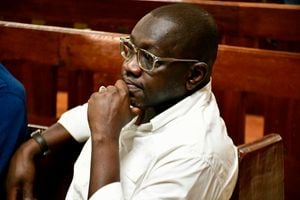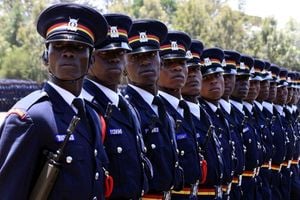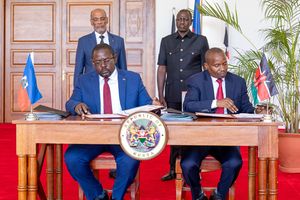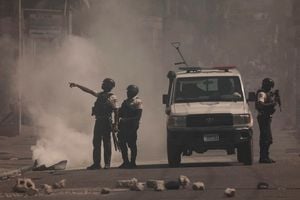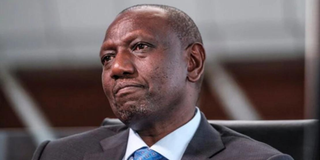
President William Ruto.
The killing of two US missionaries in Haiti, hours after President William Ruto and America’s Joe Biden outlined a plan to tackle insecurity in the Caribbean nation, adds to the volatility of the situation amid unanswered questions on the planned mission.
This, even as Dr Ruto said the first contingent of 1,000 Kenyan police officers would land in Haiti in three weeks.
Mr David Lloyd and his wife Natalie were killed alongside Jude Montis, 45, a pastor who is Haitian when a gang descended on a compound the group has been operating from.
They also stole the organisation’s motor vehicles.
“They were attacked by gangs this evening and were both killed. They went to heaven together,” Ben Baker, the father of Natalie, said in a statement.
Also Read: Ruto steps up defence on Haiti deployment
For Dr Ruto, the question of the volatility of the situation is just the tip of the iceberg, with many unanswered legal and operational questions — including operational issues and a court process in Kenya where lawyers Ekuru Aukot, Miruru Waweru and former Mukurwe-ini MP Kabando wa Kabando have questioned the deployment, saying pre-conditions set by an earlier court order stopping the sending of troops to Haiti had been not addressed.

A masked man calls on demonstrators to stop during a protest against Prime Minister Ariel Henry's government and insecurity, in Port-au-Prince, Haiti March 1, 2024.
The conditions included the presence of a recognised government in Haiti, legitimacy of a deal signed by former prime minister Ariel Henry — who has neither parliament nor Cabinet to approve it — and the fact that a deal signed between Dr Ruto and Mr Ariel has never been gazetted.
“None of the legal questions that we raised have been answered. Let it be known that sending police to Haiti remains unconstitutional and not even the President has the powers to go against the constitution which is the highest law in our land,” Dr Aukot told Sunday Nation.
However, during a BBC interview during his State visit to the US, President Ruto said the transitional presidential council had endorsed the Nairobi deal in writing.
In March, a surge of gang violence forced then-Prime Minister Ariel Henry to resign shortly after inking the Kenya mission.
Haiti’s Transitional Presidential Council, established last month, is in the process of establishing operational structures, but has been beset by internal divisions.
Dr Aukot and the duo, under a certificate of urgency, have asked the court for an injunction against the planned deployment, but the order is yet to be given.
Hard questions
President Ruto also has to contend with fresh questions about the need to deploy nearly 12,000 kilometres away — to a country with no shared border or history — when internal security challenges have not been addressed.
But Dr Ruto defended the move, saying Kenya can secure its citizens, as well as deliver on its international obligations in the interest of democracy and peace.
Saying he had deployed 3,000 military personnel and over 2,000 police officers to deal with banditry in the vast North Rift region, Dr Ruto celebrated Kenyan troops sent to Somalia, Yugoslavia, Sierra Leone, and recently, the Democratic Republic of Congo as part of the country’s role in global security efforts.
He also dismissed claims that Kenya was an US proxy in Haiti — despite the US funding the United Nations-backed mission.
“I am the president of Kenya and it is me to make that decision. It is the people of Kenya to commit their own troops using their own structures,” President Ruto said in a joint press conference with President Biden this week.
More unanswered questions for President Ruto lie in just what the Kenyan troops will do when they land in Haiti: Will they confront the gangs? What kind of lethal force is recommended? Is their role to merely help to maintain the peace? How long do they intend to remain in the notoriously difficult country?
Also Read: Explainer: Haiti called for security support. Who answered?
As it is, what is in the public domain is that Kenya will lead a Multinational Security Support Mission (MSS) which has got the green light from the United Nations’ powerful Security Council.
CNN quoted documents it said showed the mission will be helmed by a Kenyan police commissioner and a Jamaican police lieutenant, with other top posts filled by Kenyan staff.
The Bahamas, Bangladesh, Barbados, Belize, Benin, Chad, and Jamaica have also promised to contribute personnel to the mission but are yet to reaffirm this.
A UN-managed trust fund for the mission currently contains $21 million, provided by Canada ($8.7 million), the United States ($6 million), France ($3.2 million) and Spain ($3 million), the CNN reported.
There are also questions about just why it is taking so long to deploy the officers, including the fact that the MSS base near Toussaint Louverture airport in Port-au-Prince is not complete yet, and there are questions about the state of the equipment.
President Ruto put the completion rate currently at 70 per cent.
CNN also suggested that the absence of medical evacuation helicopters, which were to be provided by El Salvador, has further complicated the process.
Kenya was to deploy by May 23, and Jamaica by June, both having been delayed.
For Kenya, a number of top police officers led by Deputy Inspector General of Administration Police Noor Gabow are in Haiti ahead of the deployment of more officers from Kenya.
On May 18, a number of officers left Nairobi and arrived in Haiti two days later.
But Haitians are still divided.
Demos
On Thursday this week as the two Presidents were engaging and discussing the current security state in the Caribbean-based country, Haitian nationals living in the US staged demonstrations outside Kenya’s embassy in the USA against the mission.
The demonstrators demanded that the plans to deploy police officers to Haiti is stopped.
But even before the deployment, more concerns have been raised by Haitian police and civil society groups on the confusion and opaqueness in collaboration.
Haitian National Police Union Secretary Mr Jean Baptiste in a statement shared with the Sunday Nation said there was need to change the leadership of police bosses in Haiti.
“What we’re seeing is the international community working with a few sectors with no clear plans on what they’ll do and how. We don’t even know how we will communicate with the Kenyan police officers who speaks English. We speak French and Creole in Haiti,” the police union said.
“We believe only Haitian police can provide long term security for Haiti. What we need are materials and logistical support.”
Haitia anti-corruption group Nou Pap Dòmi (NPD) echoed the concern about transparency, noting that there needs to be clear mechanisms of accountability for the foreign forces’ conduct.
Justice Martin Mavenjina, the Kenya Human Rights Commission Senior Programme Advisor- Transitional Justice, said: “With no framework on how to hold them to account while deployed in Haiti, there is a high likelihood that they will commit serious human violations.”
Key roads, especially those leading from the Toussaint Louverture International Airport , the main airport in Haiti, are controlled by the united gangs.
Some of the gang leaders who have openly spoken against the deployment include; Johnson André, known as Izo and Jimmy Cherizier alias Barbecue who this week said that the mission will be violently resisted.
Jimmy Cherizier is the most dreaded and feared gangster in Haiti and convinced the gangs to stop fighting each other and unite against the government. They then formed an alliance of gangs called Viv Ansanm, or “Living Together.”
Yesterday, Mr Gedeon Jean who is the Centre for Analysis and Research in Human Rights boss said that the gangs had even taken control of key police stations in Haiti.
“Some of the strategically placed police stations have been burnt down by the gangs and others are being manned by the same gangs,” he said.
Mr Mavenjina said Kenya itself had not met the UN ratio of one police officer to every 300 citizens.
The gangs in Haiti have both automatic and semi-automatic rifles as well as higher-caliber weapons, including the M60 machine gun.
Mr George Musamali, a former officer, disagrees, saying the kind of weapons do not matter but how the Kenyan officers will operate while in Haiti is key.
Giving an example of what happened in Somalia during the Kulbiyow and El Adde attacks where hundreds of Kenyan soldiers died following attacks carried out by Al Shabaab militants.
“Do we have an entry plan? It does not matter the kind of weapon the officers will be carrying. A study on the gangs in Haiti reveals they have superior weapons like thosr used by the US military. What plans does Kenya have?” Mr Musamali posed.
“Here, our officers know that they are going to deal with gangs but in Haiti the gangs are known as freedom fighters they should also put that into consideration,” he added.
The gangs have caused widespread disruption.
“While NPD believes that international support is necessary to address the crisis, we have always advocated for an approach that focuses primarily on strengthening the Haitian National Police so that it can address these challenges with lasting effect,” the group said in a statement to CNN.

